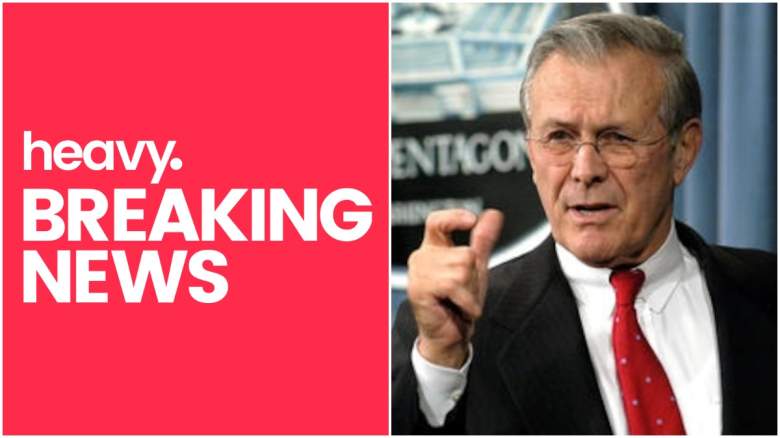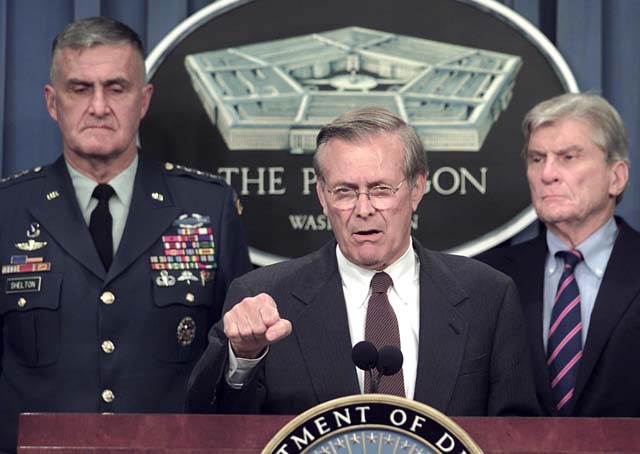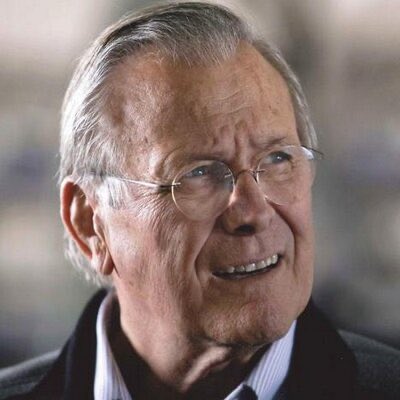
DOD Donald Rumsfeld
Donald Rumsfeld, the former U.S. Secretary of Defense under George W. Bush whose involvement in the Iraq War made him a polarizing political figure, is dead at the age of 88.
Rumsfeld’s family confirmed his death in a statement posted to his official Twitter page.
It reads, “A statement from the family of Donald Rumsfeld.”
“It is with deep sadness that we share the news of the passing of Donald Rumsfeld, an American statesman and devoted husband, father, grandfather, and great grandfather. At 88, he was surrounded by family in his beloved Taos, New Mexico.”
The statement continued, “History may remember him for his extraordinary accomplishments over six decades of public service but for those who knew him best and whose lives were forever changed as a result, we will remember his unwavering love for his wife Joyce, his family and friends, and the integrity he brought to a life dedicated to country.”
A cause of death was not given. Reaction to his death online was as polarizing as ever.
Here’s what you need to know:
Rumsfeld Was a Former Navy Pilot & Congressman Who Served as the Nation’s 21st Secretary of Defense

GettyUS Secretary of Defense Donald Rumsfeld (C) briefs reporters with US Joint Chief of Staff General Hugh Shelton (L) and US Senator John Warner (R), R-VA in Washington, DC, following terrorist attacks in New York and the Pentagon.
Rumsfeld held many prominent positions in government.
“Donald H. Rumsfeld served as the 21st Secretary of Defense from January 2001 to December 2006. Before assuming this post, the former Navy pilot had also served as the 13th Secretary of Defense, White House Chief of Staff, U.S. Ambassador to NATO, U.S. Congressman and chief executive officer of two Fortune 500 companies,” his government bio reads.
“Secretary Rumsfeld had directed the actions of the Defense Department in response to the terrorist attacks on September 11, 2001. Thus far, the Global War on Terror has resulted in the liberation of 25 million Afghanis and 27 million Iraqis, with free elections in both of those nations. Two-thirds of known Al Qaeda leaders have been captured or killed.”
It continues,
The war is being waged against a backdrop of major change within the Department of Defense. The department has developed a new defense strategy and replaced the old model for sizing forces with a newer approach more relevant to the 21st century. Secretary Rumsfeld proposed and the President approved a significant reorganization of the worldwide defense command structure, known as the Unified Command Plan, which resulted in the establishment of the U.S. Northern Command and the U.S. Strategic Command, the latter charged with the responsibilities formerly held by the Strategic and Space Commands which were disestablished. U.S. special operations forces have been expanded and the conduct of special operations has been more closely integrated into contingency planning. He has also initiated a global restructuring of U.S. forces to better reflect the realities of the post-Cold War period, including significant shifts of forces from Europe and the Korean peninsula. The Department of Defense has developed a new model for civil service, known as the National Security Personnel System. Additionally, Secretary Rumsfeld will oversee what could be the largest round of base readjustments in U.S. history, ensuring that scarce resources are available for needed combat capabilities.
His page hadn’t tweeted for years, when his tweets focused on the Donald Rumsfeld Foundation. “Over 10 yrs ago, Joyce and I created the @RumsfeldFoundtn w/the hope of contributing to focus areas we thought were worthy of investment & attention. Now more than a decade in, we remain committed to our mission & have been fortunate to witness important progress & advancements,” he tweeted in 2018.
Reaction to Rumsfeld’s Death Was Mixed Online, With Some Offering Tributes & Others Sharply Criticizing Him
The legacy and controversies of the Iraq War loomed large in the online reaction to Rumsfeld’s death. Some offered praise.
“Rumsfeld was an American original, rest in peace,” wrote one Twitter user.
“He was kind and supportive to those around him and was a superb boss who demanded taking care of the details. Rest in Peace,” wrote another.
“Such sad news. Met him several times at church. He was wonderful. May he Rest In Peace,” said another Twitter user.
Others used expletives to refer to him. “Any deep sadness about the hundreds of thousands of Iraqi civilians he killed?” wrote one critic.
Another wrote, “did we ever find the WMDs?”
Rumsfeld Worked for Pharmaceutical Companies in Between His Numerous Federal Posts
According to his bio, Rumsfeld “attended Princeton University on academic and NROTC scholarships (A.B., 1954) and served in the U.S. Navy (1954-57) as an aviator and flight instructor. In 1957, he transferred to the Ready Reserve and continued his Naval service in flying and administrative assignments as a drilling reservist until 1975. He transferred to the Standby Reserve when he became Secretary of Defense in 1975 and to the Retired Reserve with the rank of Captain in 1989.”
In 1957, he came to Washington, DC “to serve as Administrative Assistant to a Congressman. After a stint with an investment banking firm, he was elected to the U.S. House of Representatives from Illinois in 1962, at the age of 30, and was re-elected in 1964, 1966, and 1968.”
Rumsfeld “resigned from Congress in 1969 during his fourth term to join the President’s Cabinet. From 1969 to 1970, he served as Director of the Office of Economic Opportunity and Assistant to the President. From 1971 to 1972, he was Counsellor to the President and Director of the Economic Stabilization Program. In 1973, he left Washington, DC, to serve as U.S. Ambassador to the North Atlantic Treaty Organization (NATO) in Brussels, Belgium (1973-1974),” the bio reads.
“In August 1974, he was called back to Washington, DC, to serve as Chairman of the transition to the Presidency of Gerald R. Ford. He later became Chief of Staff of the White House and a member of the President’s Cabinet (1974-1975). He served as the 13th U.S. Secretary of Defense, the youngest in the country’s history (1975-1977).”
He spent some time in private business. “From 1977 to 1985 he served as Chief Executive Officer, President, and then Chairman of G.D. Searle & Co., a worldwide pharmaceutical company. The successful turnaround there earned him awards as the Outstanding Chief Executive Officer in the Pharmaceutical Industry from the Wall Street Transcript (1980) and Financial World (1981). From 1985 to 1990 he was in private business,” the bio says.
“Mr. Rumsfeld served as Chairman and Chief Executive Officer of General Instrument Corporation from 1990 to 1993, a leader in broadband transmission, distribution, and access control technologies. Until being sworn in as the 21st Secretary of Defense, Mr. Rumsfeld served as Chairman of the Board of Gilead Sciences, Inc., a pharmaceutical company.”
His federal posts included the following:
* Member of the President’s General Advisory Committee on Arms Control (1982 – 1986);
* Special Presidential Envoy on the Law of the Sea Treaty (1982 – 1983);
* Senior Advisor to the President’s Panel on Strategic Systems (1983 – 1984);
* Member of the U.S. Joint Advisory Commission on U.S./Japan Relations (1983 – 1984);
* Special Presidential Envoy to the Middle East (1983 – 1984);
* Member of the National Commission on Public Service (1987 – 1990);
* Member of the National Economic Commission (1988 – 1989);
* Member of the Board of Visitors of the National Defense University (1988 – 1992);
* Member of the Commission on U.S./Japan Relations (1989 – 1991); and
* Member of the U.S. Trade Deficit Review Commission (1999 – 2000).
READ NEXT: James Brian Chadwell Investigated as Possible Suspect in Notorious Delphi Murders of 2 Girls


